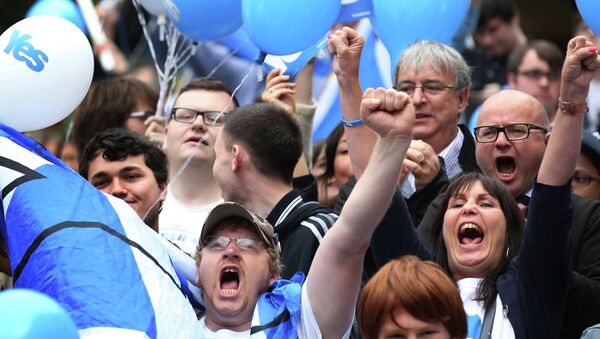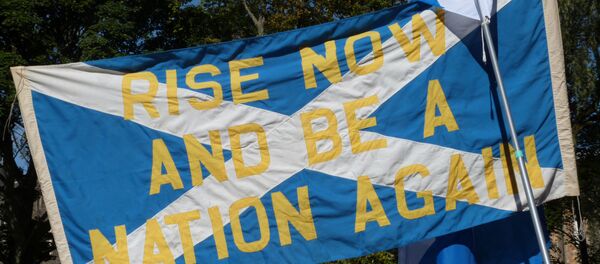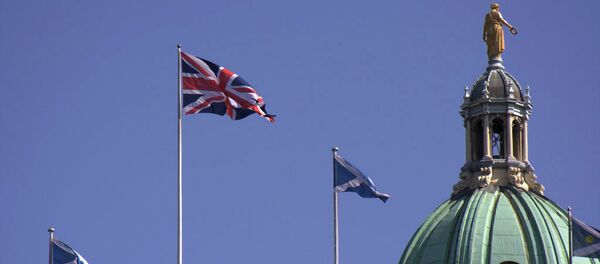EDINBURGH, December 17 (Sputnik) — Revelations that senior civil servants and officials at Buckingham Palace engineered a perceived anti-Scottish independence remark by the Queen just days before September's historic referendum will leave Yes-supporting Scots "angry", Graham Smith of the campaign group Republic has told Sputnik Wednesday.
"I would imagine that most Scots who were voting 'Yes' would be pretty angry about the fact that the Monarch was attempt to persuade Scotland to vote No," Smith, whose organization campaigns for a democratically elected head of state, said.
As the Queen entered a church, a "well-wisher" reportedly said to the Monarch "We won't ask you about the referendum," to which the Queen replied, "Well, I hope people will think very carefully about the future."
The remarks were widely seen as an endorsement for the anti-Scottish independence campaign. However, The Guardian has now published details showing that the entire episode was concocted by senior British establishment officials, who feared a surge in support for independence and wanted the Monarch to break from convention and endorse a 'No' vote.
Meanwhile, Thomas Mace Archer-Mills, who is Chairman of the British Monarchist Society, told Sputnik he was pleased the Queen had spoken out.
"I'm glad that something was said. We know where the Queen stands, we know what her leanings are, and she is Queen of a United Kingdom," Archer-Mills said.
Archer-Mills went on to accuse The Guardian newspaper of "fabricating a conspiracy" and accused Scottish National Party (SNP) Leader and Scottish First Minister Nicola Sturgeon of "creating waves of republicanism."
"[The Guardian] are fabricating a conspiracy. They are claiming that there were people behind the scenes working to make sure the Queen's views were known. Well, the Queen's views about the Union and a United Kingdom have always been known," Archer-Mills told Sputnik.
"We already know that if Scotland goes ahead and achieves independence, which it seems they are determined to do, we know now that the first minister [Nicola Sturgeon] is very republican in her leanings," Archer-Mills added.
"I don't believe for one moment that if Scotland went ahead and gained independence that they would retain Her Majesty. Nicola Sturgeon is already creating her waves of republican sentiment and stirring it all up. I think it is upsetting and sad," Archer-Mills noted.
On this, Graham Smith from the campaign group Republic said that the SNP's policy was a tactic, rather than an ideological commitment.
"The SNP's position on retaining the Monarch after independence is a tactical thing for them. I understand the tactic, but I think [The Guardian revelations] may well harden attitudes in Scotland regarding the Monarchy," Smith said in his conversation with Sputnik.
Archer-Mills agreed with his counterpart on this, telling Sputnik there were more "pressing things" that needed to be addressed.
"The SNP position on retaining the monarchy is a tactic and I do not believe it at all. I think there are more pressing things that need to be addressed rather than tackling a happy, older lady who is a grandmother to us all. I don't understand that," Archer-Mills said.
On September 18, 2014 Scotland held a referendum to secede from the United Kingdom and establish itself an independent state. The political idea, however, was rejected by over 55 percent of Scots, with Scotland continuing to remain a part of the United Kingdom.






